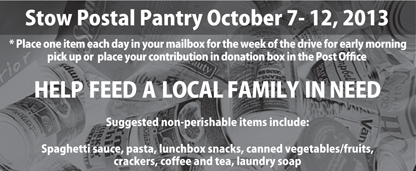
By Ann Needle
Could you feed yourself — or your child — on $6 per day? Take away $1, and what food would you cut out? That is the dilemma many people wrestle with daily. And, come next month, recipients of SNAP benefits (Supplemental Nutrition Assistance Program) will see their budgets shrink even further.
For the Stow Food Pantry, this is the reality it tries to make a bit less daunting. And, its annual Postal Pantry Share the Bounty Food Drive, October 7 to 12, is the food bank’s biggest source of items and financial donations every year, according to Food Pantry President Amanda Bennett. Now that most SNAP recipients will see their benefits reduced by November, the Pantry must use this drive to help gear up for an expected increase in clients.
“A few years back, when the government last cut SNAP, we had a big increase in clients,” said Bennett. “Most families are going to take at least a $30 cut.” Add to that the cuts to programs such as Meals on Wheels due to the government budget shut down and the Food Pantry will see even greater need.
According to the MA Dept. of Health and Human Services, a family of four will take a $36 cut in the maximum monthly SNAP benefit it receives, trimming this amount from $668 (about $6 daily per person) to $632 ($5 daily per person). This maximum is adjusted for factors such as income and number of family members. The November reduction is due to extra funding running out from the American Recovery and Reinvestment Act, which was put in place in 2009 to help stimulate the economy during the recession.
As it is, SNAP does not pay for much, Bennett noted. “If you stick to the budget, you find yourself eating a lot of starch and rice.” Despite the government-calculated SNAP allowance, the U.S. Dept. of Agriculture estimated that a family of four needs about $146 to $289 a week to eat a healthy diet.
“Mostly, they [SNAP benefits] only last until the 15th of the month,” Bennett said. “We always have more people at our second food pantry of the month.” Located in the basement of First Parish Church, the Pantry distributes food to clients twice a month, on the second and fourth Fridays.
What the Postal Pantry Needs
For the Postal Pantry, residents are asked to donate one non-perishable item each day, Monday through Saturday, simply by placing it in the mailbox for pick-up by the U.S. Postal Service. As generous as Stow is, Bennett asked people to keep donations to just one per day in their mailboxes, as the mail carriers don’t have the room in their trucks to carry more. Those with post office boxes or who want to donate more than one item per day, can drop off items in the Stow Post Office lobby donation box.
Canned foods common to most households are always welcome. These could include soups, vegetables, fruits, and chilis. Other non-perishable staples range from cereals to breads and crackers. And, there is always a need for healthy, children’s lunchbox snacks. Bennett reminds everyone to check the expiration date of each item before donating.
The vital, perishable foods — fresh fruits and vegetables, cheeses, lean meats —often are donated by local farms and Stow Community Gardens, Bennett said. She added that the rest of the items come out of tax-deductible donations. Cash donations can be made in care of the Stow Food Pantry, P.O. Box 437, Stow.
Bennett always suggests people put personal care items on their donation lists. SNAP does not pay for what many would view as personal essentials, such as toothpaste, soap, and laundry detergent. “We try to provide things for dignity of life. Just because you’re poor doesn’t mean you can’t have deodorant or clean clothes. If you’re clean, you feel much better about yourself,” Bennett remarked. “Even a small container of laundry detergent can run $5.”
Observing the Food Pantry’s latest visitors, Bennett mentioned that they are seeing an increase in elderly, single men (think shaving supplies and soap for personal care items), and continue to see several larger families. “About 80% of our clients are the working poor. These are minimum wage people; they work at the gas station, they work at the coffee shop.”
Bennett concluded, “There are lot of people living here paycheck to paycheck.”
